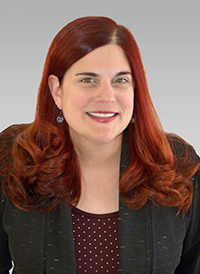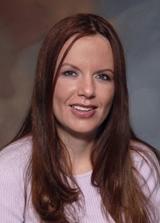AAMC Seminar Develops Leadership Skills for Mid-Career Women Faculty
To support the development of mid-career women faculty, the Association of American Medical Colleges (AAMC) offers the Mid-Career Women Faculty Leadership Development Seminar, held most recently from December 7-10, 2019. While the AAMC offers a similar seminar for early-career women faculty which focuses on foundational skills, this seminar goes one step further by covering more organizational leadership topics, such as the dynamic between personality and its role in leadership, and resiliency and wellness.
This year, the Department of Internal Medicine was honored to send two talented women faculty members to this seminar: Drs. Ellen Beswick, an Associate Professor in the Division of Gastroenterology, Hepatology & Nutrition and Marissa Grotzke, an Associate Professor in the Division of Endocrinology, Metabolism & Diabetes. Both Beswick and Grotzke hold key leadership positions in the department, but found themselves interested in attending for different reasons.

Ellen Beswick is the Associate Director of GI Research, and Director of the GI Tissue Bank. She considers herself in a unique position within the Gastroenterology division as she is the only PhD and the only tenure track woman faculty member in a clinically-focused division. Her hopes by attending the Mid-Career Seminar were to acquire more skills to promote leadership in research and mentorship.
She resonated most with the Pace Palette workshop, where attendees identified which “color” their personality matched with most. Each color had a different personality and unique leadership style: yellow as “by the book;” red for creative types; green for those with more introverted and logical personalities; and blue, for those who seek to work and promote harmony.
“I learned which colors resonated most with me – red and green – but also which personality types are most difficult for me to work with on a team and how to best work with them despite our differences,” Beswick says. “Most importantly, I learned that successful and effective teams incorporate every color of the palette. You can’t have a team of all reds or all greens – every color needs to be represented.”
Marissa Grotzke is an assistant program director for the endocrinology fellowship, and medical director for the osteoporosis and transgender services at the Salt Lake City Veterans Affairs Medical Center (VAMC). She is also the medical director for the Bone Health Team, a clinical project aimed at avoiding osteoporotic hip fractures through primary prevention; though the project has found success in its six years at the VAMC, implementing it at the University of Utah Hospital is the next major step. Grotzke hoped the AAMC Mid-Career Seminar could help her formulate a game plan to tackle the next steps in this project.
The Mindfulness and Wellbeing workshop was of particular interest to Grotzke, who learned that one doesn’t necessarily need to take a three-week vacation to take a break. “Not only did the workshop teach us some tips to being mindful in the moment, but we had a chance to break into small groups and discuss ways others manage their stress throughout the day,” she says. “Someone I chatted with in my small group gave me a suggestion on calendar management to give myself a more realistic overview of my day, rather than a written out to-do list. So far I am finding it very useful in my mindfulness practice because it allows myself to realistically ask: how much time can I really commit to this without sacrificing my body and mind?”
Small group breakout discussions throughout the different larger workshops allowed for further networking. Every day of the seminar, attendees would be assigned to sit with groups at tables based on their different responses to their seminar applications.
 “The AAMC is very savvy at helping attendees network,” Grotzke says. “The first day, I sat at a table with everyone from my specialty; the next day, my table was based on level of involvement in teaching; the day after that, it was people only from my region. I walked away with many contacts from across the United States who are interested in collaborating.”
“The AAMC is very savvy at helping attendees network,” Grotzke says. “The first day, I sat at a table with everyone from my specialty; the next day, my table was based on level of involvement in teaching; the day after that, it was people only from my region. I walked away with many contacts from across the United States who are interested in collaborating.”
While Beswick also made several new contacts with those in outside organizations, she was pleased to network with fellow faculty members from the University of Utah. “We had three total attendees from the U, myself and Dr. Grotzke included, and one faculty member from Family & Preventative Medicine,” she explains. “Because we all were from such different areas of focus, I don’t think I would have ever met them at the U if I had not gone to this conference, which is crazy to think about!”
Small group breakout discussions allowed for moments to give and receive feedback on various skills, as well as for feedback on current or upcoming projects. Dr. Grotzke, for instance, sought feedback on her Bone Health Team project, while still offering her own experiences and guidance to others. “When you give someone feedback, you can also channel this feedback back to your own project. Helping others can help yourself grow and learn. I now have the direction and energy to work on this project that I didn’t have before,” she says.
“I received feedback during a workshop from a clinician who was very different than me in every way, and it was incredibly useful to see their perspective,” Beswick says. “As a PhD, I was excited to talk with people I would never usually have the opportunity to speak with normally, such as ER physicians, hospitalists, and other clinicians.”
The skills and experiences of the AAMC Mid-Career Women Faculty Leadership Development Conference will remain with Drs. Beswick and Grotzke as they progress in their careers. They both strongly encourage other women faculty to attend, but especially for faculty at the more junior level.
“I can’t think of a reason not to go,” Grotzke claims. “The AAMC has worked hard to present this multi-focused seminar. No matter your goal, you will gain from it. I did not attend the Early-Career seminar, but knowing what the Mid-Career seminar did for me, I can only imagine the great information I would have received in the beginning of my career.”
Applications for the next Mid-Career Women Faculty Leadership Development Seminar will open early August 2020. For women faculty interested in the Early-Career Seminar, please note that applications will open in February 2020. More information about all leadership development opportunities can be found on the AAMC website.
For application assistance or questions, please contact Dr. Michael Rubin, Vice Chair of Faculty Affairs & Development at Michael.rubin@hsc.utah.edu.